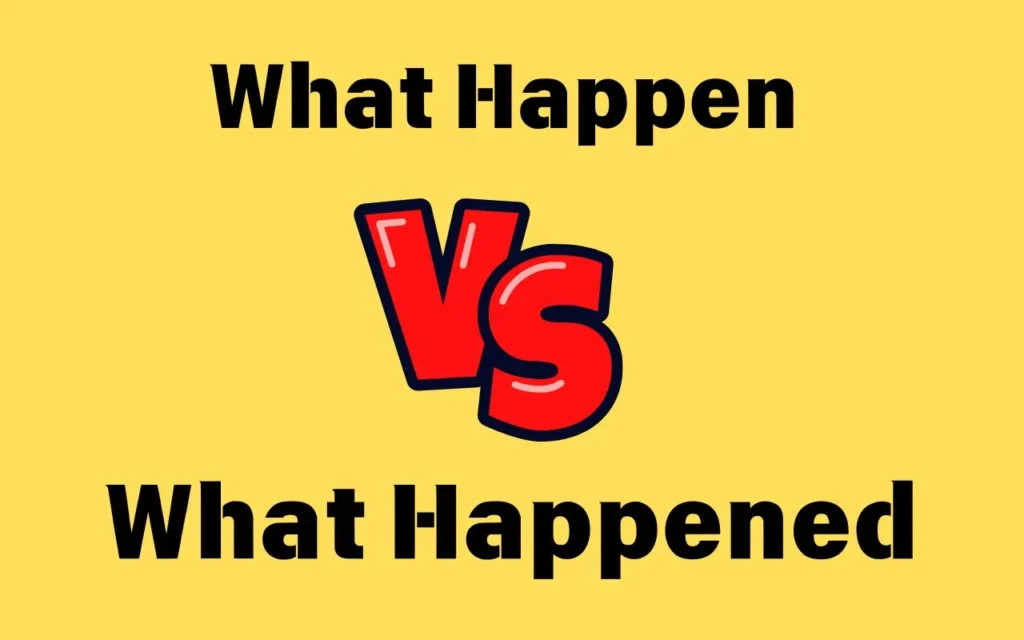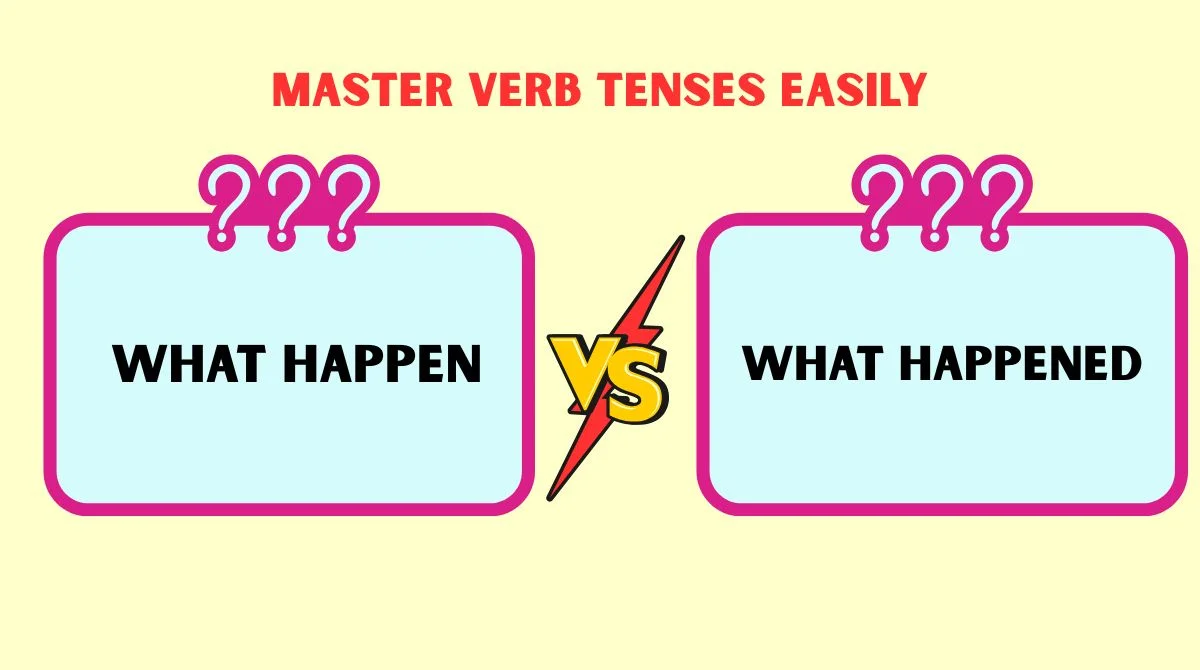Last updated on September 23rd, 2025 at 08:19 am
English grammar can often be confusing, especially when it comes to verb tenses.
A common dilemma many face is understanding whether to use “what happen” or “what happened.” While both may sound somewhat similar, only one is correct in standard English.
What happen or what happened? Only one is correct in standard English! Learn the key differences with examples and tips to master your grammar.
In this guide, we’ll explore the rules behind verb tenses, the correct usage of “happened,” and why understanding grammar nuances is essential for clear communication.
Understanding the Basics: Present and Past Tenses in English

In English, verb tenses play a critical role in expressing time. There are three primary tenses:
- Present tense: Describes actions happening now or general truths.
Example: “I walk to school every day.” - Past tense: Refers to actions that have already happened.
Example: “I walked to school yesterday.” - Future tense: Describes actions that will happen.
Example: “I will walk to school tomorrow.”
In the context of “happen” vs. “happened,” the confusion arises because “happen” is in the present tense, while “happened” is in the past tense. Understanding this distinction is the foundation for choosing the correct form.
The Role of Verb Tenses in Clearly Communicating Time
Verb tenses are essential for placing an action in its proper time frame. Without proper tense usage, sentences lose clarity. Consider the difference:
- What happen? (Incorrect): The present-tense verb “happen” doesn’t match the question format or convey past action.
- What happened? (Correct): The past-tense verb “happened” aligns with the implied question about an event that already occurred.
Correct tense usage ensures that the reader or listener can follow the timeline of events without confusion.
How Incorrect Tense Usage Can Lead to Confusion
Misusing tenses often results in ambiguity or miscommunication. For instance:
- Incorrect: “Yesterday, I see what happen.”
- Correct: “Yesterday, I saw what happened.”
The incorrect sentence creates confusion because the present-tense verb “happen” conflicts with the past-tense context of “yesterday.” This inconsistency makes it harder for the reader or listener to understand when the action took place.
Grammar Deep Dive: The Verb “Happen” Explained
The verb happen is intransitive, meaning it doesn’t take a direct object. Its primary meaning is to describe events or occurrences.
- Present tense: Happen
Example: “Strange things happen in this town.” - Past tense: Happened
Example: “Something strange happened yesterday.” - Present participle (continuous tense): Happening
Example: “Something strange is happening right now.” - Past participle (used in perfect tenses): Happened
Example: “Something strange has happened.”
The correct usage depends on the time frame being referenced.
Common Misconceptions in English Grammar
One of the most common misconceptions is that what happen can be used interchangeably with what happened. This error often arises due to:
- Informal speech patterns: Many people use incorrect grammar in casual conversations, which can lead to confusion about what’s standard.
- Influence of non-native speakers: In some languages, verb conjugation rules differ, leading to mistakes when speaking English.
- Autocorrect errors: Technology may fail to catch tense-related errors, especially in short phrases.
Past Tense Pitfalls: Why “Happened” is Often Misused
Learners of English sometimes struggle with the past tense because of irregular verb patterns. However, happen is a regular verb, making it easier to conjugate:
- Base form: Happen
- Past form: Happened
- Past participle: Happened
The problem often lies in not recognizing the context or timeframe of the action.
Grammatical Nuances: The Difference Between Subject and Object Questions
In English, questions can either ask about the subject or the object of a sentence. For example:
- Subject question: “Who called you?” (The person doing the action is unknown.)
- Object question: “Who did you call?” (The person receiving the action is unknown.)
Similarly, “What happened?” is a subject question because the verb happened doesn’t require a helper verb. In contrast, “What did happen?” is less common but grammatically correct for emphasis.
The Correct Usage: Investigating “What Happened”
What happened is the correct phrase when referring to events in the past. It uses the simple past tense to ask about actions or occurrences.
Examples:
- “What happened at the meeting?”
- “Can you tell me what happened yesterday?”
This phrasing is universally accepted and grammatically correct.
Real-life Examples of Proper “Happened” Use
- In storytelling: “Last night, something amazing happened at the concert.”
- In interviews: “Can you explain what happened during the incident?”
- In casual conversations: “What happened to your car?”
By consistently using happened for past events, you maintain clarity and grammatical accuracy.
When to Use “What Happened” Over “What Happen”
Here’s a simple rule:
- Use what happened when referring to past events.
- Avoid what happen entirely, as it’s grammatically incorrect in standard English.
Exploring Contextual Clues for Correct Verb Tense
Context plays a crucial role in identifying the correct tense. Words like yesterday, last night, or earlier signal the need for past tense.
Examples with Context:
- “Yesterday, what happened at the meeting?” (Past event → Use “happened.”)
- “What’s happening right now?” (Ongoing event → Use “happening.”)
Expert Opinions on English Language Conventions
Dr. Jane Smith, a linguistics professor, explains:
“Verb tense consistency is vital for effective communication. Using ‘what happened’ correctly ensures clarity, especially when recounting past events.”
Language experts emphasize the importance of mastering simple grammar rules to avoid common pitfalls.
Avoiding Common Errors: Why “What Happen” is Incorrect
Why is “what happen” wrong?
- It doesn’t conform to English grammar rules.
- The subject-verb agreement is broken because “what” implies a singular event, requiring the past tense “happened.”
By sticking to proper grammar, your communication will sound polished and professional.
FAQs
What is the difference between “what happen” and “what happened”?
“What happen” is grammatically incorrect. “What happened” is the correct phrase, referring to events that occurred in the past.
Why is “what happen” incorrect?
“What happen” is wrong because it uses the present tense “happen” in a structure that requires the past tense “happened.”
When should I use “what happened”?
Use “what happened” to ask about or describe events that occurred in the past, such as, “What happened at the party last night?”
Can “what happen” ever be correct?
No, “what happen” is not correct in standard English grammar. Always use “what happened” when discussing past events.
How can I avoid errors with “what happen” vs. “what happened”?
Focus on the context of the event. If it refers to the past, always use the past tense “happened.” Practicing grammar rules can also help you avoid errors.
Clarifying Confusion: Final Thoughts on “What Happened”
In summary:
- “What happened” is always correct for past events.
- “What happen” is grammatically incorrect in standard English.
- Understanding verb tenses and context is key to mastering this distinction.
By using the proper phrase, you’ll ensure your speech and writing are both accurate and professional.
Pro Tip: Always double-check your verb tenses to avoid common mistakes. This small habit will greatly improve your overall communication skills!
